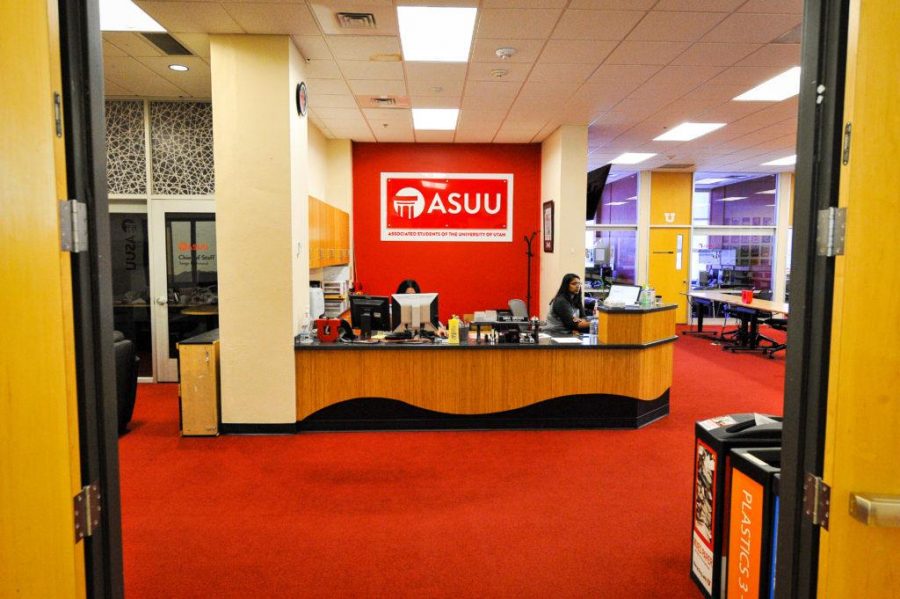The Associated Students of the University of Utah (ASUU) held its biannual town hall to discuss the progress of student government this academic year as well as to address the concerns of student groups and individuals on Wednesday, Feb. 28.
Lilly Kanishka, the director of ASUU’s Diversity Board summarized the goal of the event as a way to “address student concerns as well as get people involved with their student government beyond just using student government like a piggy bank.”
Kanishka updated the audience on ASUU’s achievements, including planning to hire a full-time office advocate who is able to refer students in need to resources across campus, establishing monthly openhouses on finances and advocacy for student organizations and instituting a 48-hour email return policy for all executive members of ASUU to improve communication within the executive branch. With these changes, Kanishka stated, ASUU hopes to improve student government’s ability to engage with the larger student body and increase overall transparency.
Student Services Director Pablo Zarate discussed changes that have been coordinated among student organizations in order to improve student advocacy. Zarate said that his board has worked to increase attendance at student events by partnering with several student organizations to promote and network.
Zarate’s board also organized UCard discounts at various stores and restaurants throughout the valley. Student Services plans to spread the word about student discounts by posting flyers and working with ASUU marketing.
Developments from ASUU administration included a recent legislative success that will draw money from student fees to allocate more funding to the Counseling Center, which helps students manage their mental health needs. The student fee, beginning in the next four years will increase incrementally from $4 to $12 to support what ASUU President Zach Berger described as an understaffed and overworked Counseling Center.
Parking, a concern for many of the commuting students at the U, was also a top priority for the administration. Berger and his team are trying to turn several A permit lots to U permit lots and are working with incoming U President Ruth Watkins regarding the future of parking.
Berger also discussed upcoming activities at the U.
“Look out for a concert announcement your way,” Berger said in reference to the release of the lineup for RedFest, the U’s annual campus-wide concert, which is on April 19 this year.
He went on to discuss updates in the ASUU Constitution bylaws, which he said were previously contradictory, and a gradual reallocation of 5 percent of Campus Events Board (CEB) funds toward student organizations. The proposal to alter CEB funding has the potential to double the amount of funds given to student organizations, Berger said.
After Berger concluded, ASUU took feedback from the campus community.
Those in attendance focused on four major themes — marketing, communication, funding and bias.
A representative from the Women’s Resource Center presented issues with the assembly process, which she said led to lower funding for left-leaning student organizations compared to right-leaning student organizations on campus. Assembly Chair Anna Barnes apologized for any unfair treatment that previously occurred due to assembly members’ personal biases. Barnes said she believes that such bias will occur less frequently in the future, as assembly members are now mandated to take a holistic approach toward funding considerations. ASUU recommends that if bias continues to occur, student groups appeal to the Supreme Court and contact the Assembly Chair or the Office of Equal Opportunity and Affirmative Action if the assembly displays prejudice against a federally protected class.
Funding continued to be discussed as a member of Delta Sigma Theta sorority lamented the “atrocious funding process” that her organization faced as they received “different rules from different representatives ending up with [Delta Sigma Theta] having to pay for our events with our own money.” Barnes responded by expressing concern and describing her efforts to increase transparency through mandatory assembly standards and implementing clearer rules for finance representatives.
A member of Young Americans for Freedom (YAF) addressed his concern with budget allocation. Specifically, the YAF member addressed how events like the Conference on Diverse Excellence (C.O.D.E.) did not “represent a majority of the views on campus, and cause frustration for the half of the campus that do not wish to see their student fees contributing to campus events.”
Kanishka challenged his perspective, saying that even ASUU boards must go through the extended approval process for legislative funding, and that events such as Jesse Williams speaking on racial injustice at C.O.D.E. were requested by students after racist incidents on campus, including anti-Black vandalism and flyers posted around campus.
Other student organizations requested greater communication and representation with graduate students.
“The need for student government doesn’t stop once you cross Legacy Bridge,” said a representative from a recently formed student organization for the nursing program. “The needs of grad students need to be represented and respected similar to undergraduate students in ASUU processes.”
Student government representatives created plans with student groups to discuss their grievances and feedback. They approached those with concerns individually to find a solution to each respective issue. Although passions ran high as parties discussed issues of funding and bias, the night ended respectfully as members met to discuss problems one-on-one.
“Those who have questions about student government, want to get involved or have concerns are always welcome to stop by the ASUU office,” said Kanishka. “ASUU is always striving to be a more inclusive place with a more active and open dialogue with students.”
@thegracemason


